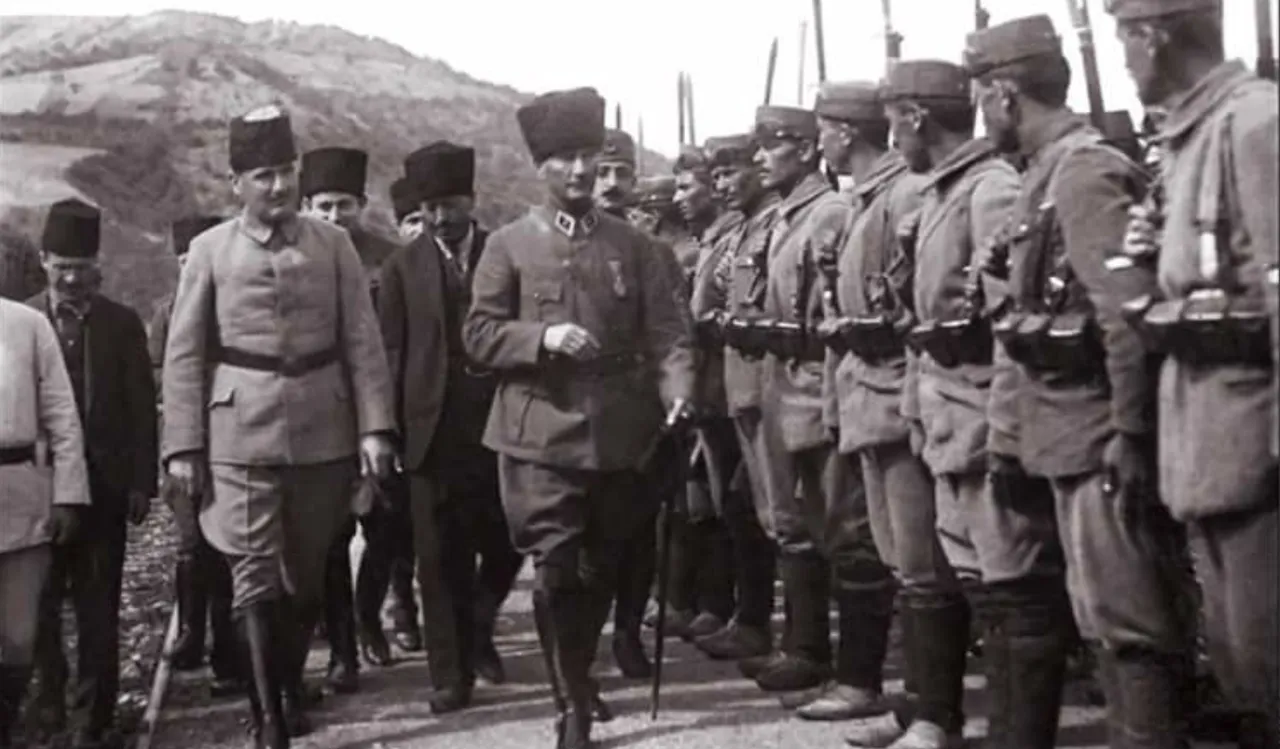Mustafa Kemal was three years in Damascus under the command of the 5th Army and saw almost all parts of Syria during the three years of his training. He had seen the shortcomings in the administration of the country and the shortcomings of the army in his training even more closely than from hearing. In October 1905 he founded with some friends whom he trusted, the Society for Patriotic Freedom ("İttihat ve Terakki Cemiyeti"). Together with his friends he expanded the community he had founded in Beirut, Jaffa and Jerusalem.
From here he secretly moved to Jaffa, via Greece and back again via Thessaloniki, where he founded a branch of the Society for Patriotic Freedom before returning to Jaffa. Although the government got wind of the venture, Mustafa Kemal was not punished back in Damascus because his superiors protected him. At this time, on June 20, 1907, he became Colonel (Commander-in-Chief) and was appointed to a higher post in the Army Staff in Damascus.
On 13 October 1907 Mustafa Kemal was called to the 3rd Army Headquarters in Manastir and arrived in Salonika to serve in the staff department of that headquarters. At that time the Society for Patriotic Freedom, which included the founders of the Patriarchal and Freedom Society branch in Thessaloniki, was secret. Mustafa Kemal also joined this community. Efforts to be saved from the management of the country and the government were his main idea. Shortly after his arrival in Thessaloniki, on 22 June 1908, he served as railway inspector between Skopje and Thessaloniki in addition to his post at the 3rd Army Headquarters.
At that time, the Union and Progress Society, a secret activity in Rumeli, forced Sultan Abdulhamid to reenact the 1876 constitution and summon the re-closed Mebusan Assembly. The initiatives of the Committee on Union and Progress have gradually achieved the declaration of the constitutional monarchy.
When the second constitutional monarchy was proclaimed on 23 July 1908, Mustafa Kemal continued his military service in Salonika and followed the political developments in Istanbul by also continuing his activities in the Union and Progress Society. He did not see the frugality that followed a great revolution such as the constitutional monarchy, and he believed that greater and more radical changes should be made in the country by seizing this opportunity. However, his views did not correspond to those of the elders in the Union and Progress Society. But he was not afraid to tell them his ideas.
Only nine months after the declaration of the Second Constitutional Monarchy on 13 April 1909 in Istanbul a great rebellion was supported by this movement of reactionary circles. Mustafa Kemal was appointed Chief of Staff of the Movement Army under the command of Hussein Husnu Pasha, who was founded in Rumelia, to suppress the rebellion known as "March 31". When the Army of Motion came to Hadımköy near Istanbul, the order was changed. Mahmut Sevket Pasha, commander of the 3rd Army from Thessaloniki, took over the command; Major Enver Bey was appointed Chief of Staff.
The Rebellion Army invaded Istanbul on April 24, 1909. Mustafa Kemal also served in the staff deployment of this army. Sultan Abdülhamit was deposed and Sultan Reşat was replaced by the Movement Army. After the suppression of this reactionary event, Mustafa Kemal did not stay in Istanbul and returned to Thessaloniki on 22 May 1909. During the military manoeuvres in and around Thessaloniki, he courageously defended his ideas and opinions, drew the attention of his superiors to himself and translated old works and texts on military topics.
Mustafa Kemal recognized the dangers of his close association with the Union and Progress Society and his political involvement after the second constitutional period. He spoke publicly at the Ittihat ve Terakki Büyük Congress on 22 September 1909 in Thessaloniki. But the leaders of the society did not share his views. Mustafa Kemal only served the military by staying out of the league. The conflict with the Committee for Union and Progress brought Mustafa Kemal and society apart.




 Part 1
Part 1
